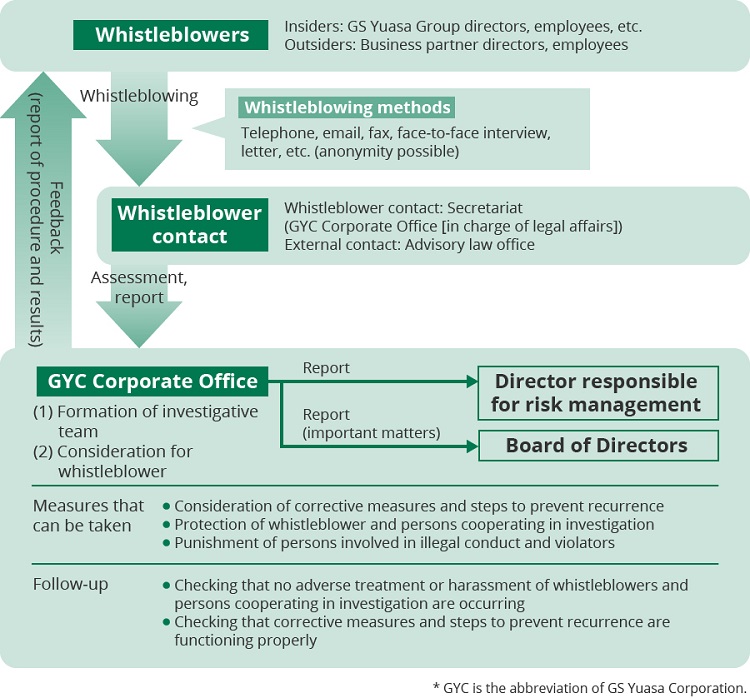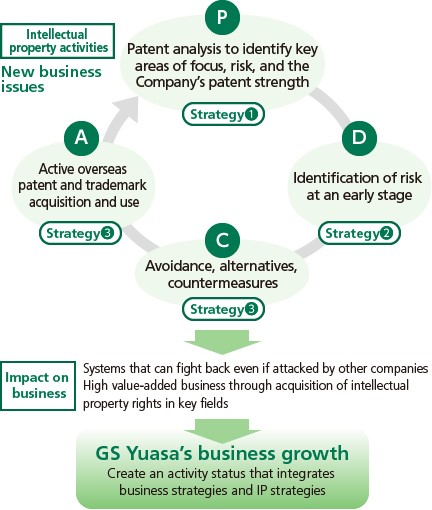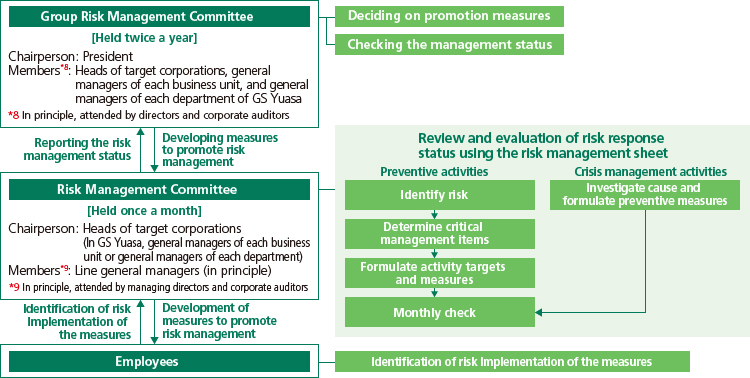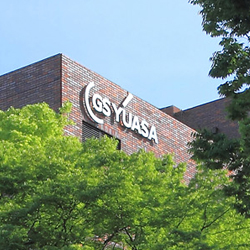Developing Fair, Transparent and Sound Business and Anti-Corruption
We see ethical management as the basis for coexisting with society
while achieving long-term corporate growth and a sustainable society.
Compliance with Laws, etc.
Basic Philosophy on Promoting Compliance
The GS Yuasa Group recognizes that in order to contribute to people, society, and the global environment through our corporate philosophy of “Innovation and Growth,” it is essential for all employees to adhere to laws, regulations, company rules, and ethical standards.
The Compliance Declaration made by the President states that success must never be achieved through legal and moral infringements and that “establishing rules and structure” and “developing a strong sense of commitment to realize compliance” are essential to becoming a corporate leader in compliance. Based on these guidelines, multifaceted compliance promotion activities are developed at every employee level, and each employee is encouraged to incorporate self-directed and proactive actions to yield an effective improvement in compliance awareness.
Policy on Compliance (Excerpts from Our CSR Policy)
The GS Yuasa Group conducts a transparent business policy which aims to earn the trust of customers, business partners, shareholders, and of local communities as a top priority. And to adhere to laws and regulations of each country and region. Furthermore, we address to prevent any kind of corruption, will not tolerate any illegal political contribution, bribery of public officials, and will not have relationships with personnel or organizations of organized crime.
Refer here for the full text of the Compliance DeclarationCompliance Risk Management Structure

Permeation of Compliance Awareness
The CSR Manual, which delineates our corporate philosophy and rules for adherence by every corporate Group member, is distributed to all employees to facilitate compliance awareness.
The manual clarifies Group CSR policy and outlines behavioral standards which each employee must follow during business activities. To facilitate its usage as a tool for employees in gauging behavioral standards, the manual delineates following items:
- Concrete examples of compliance operations and the occurrence of compliance risks (explanations using a question and answer format and columns)
- Diagnostic checklist to help employees assess their own adherence to corporate behavioral standards.
The manual further details how to use the internal whistleblower system for simple risk detection and introduces an emergency contact system for use in a crisis to realize quick responses to compliance infringements.
Workplace Meetings on Sustainability
To ensure that awareness of sustainability based on our corporate philosophy and CSR Policy reaches each and every employee, the GS Yuasa Group conducts training programs on sustainability issues in the form of meetings at each workplace.
These training programs target employees (including fixed-term and dispatched employees) at all workplaces of the major business company (GS Yuasa International Ltd.) and Group companies in Japan (21 companies). Also, the educational materials used in the meetings have been made by the division in charge for each topic and include content related to the circumstances of the Group. Vigorous debates took place at many of the meetings held in fiscal 2024, and 97% of the workplaces rated them as meaningful. We intend to continue running these meetings and upgrading the content to ensure that it is both up-to-date and educational.
Examples of themes of Sustainability workplace meetings
- Contribution to the SDGs through the Practice of Our Corporate Philosophy
- Environmental education (climate change)
- Respect for diversity
- Preventing intentional wrongdoing
- Handling confidential information
- Subcontracting laws
- Personal information protection
- Security trade controls
- Sexual/power harassment
- Management of working hours
- Occupational health and safety
- Manufacturing process and product safety
Internal Whistleblower Program
We established an internal whistleblower system (GS Yuasa Group corporate ethics hotline) that allows Group directors, employees (including part-time and short-term employees), advisors, temporary workers, workers who provide work to the Group under worker dispatch or subcontracting agreements, and the directors and employees of business partners to anonymously report if they discover any violations of laws and regulations or company rules, other improper or inappropriate conduct by Group employees, and other matters that may constitute such violations or improper conduct.
The system includes internal and external whistleblower contacts* that make it possible to submit reports 24 hours a day, 365 days a year by email and other means. A management division (Corporate Office) that is independent from management and business divisions rigorously investigates the particulars of reports and responds promptly and appropriately according to the severity and urgency of the matter. In addition, we ensure that information relating to whistleblowers is managed rigorously and that whistleblowers are protected in accordance with the Whistleblower Protection Act so that they are not subject to disadvantageous treatment as a result of making a report. We put up posters about the hotline at key locations of all business sites and domestic Group companies to inform employees of the Company and domestic Group companies as well as others.
In fiscal 2024, we received 23 reports relating to harassment and other matters. We conduct inquiries and take appropriate action, on these matters, while remaining committed to protecting whistleblowers.
In addition, we survey all employees of domestic Group companies about compliance once each year to raise awareness of compliance with the aim of detecting any compliance violations at an early stage and preventing violations. If any improper or inappropriate conduct (including circumstances relating to compliance risks that may arise in the future) are identified as a result of the survey, we make any necessary improvements.
There are limits on operating days and hours for some reporting methods (such as telephone and face-to-face interview).
Operating Structure of the Internal Whistleblower System (GS Yuasa Group corporate ethics hotline)

Number of reports to the GS Yuasa Group Internal Whistleblower System (GS Yuasa Group corporate ethics hotline)
| FY | Number of reports |
|---|---|
| 2020 | 4 |
| 2021 | 8 |
| 2022 | 9 |
| 2023 | 31 |
| 2024 | 23 |
Elimination of Antisocial Forces
The Group believes that, in order to fulfill its corporate social responsibility, it is imperative that business be conducted in accordance with the law without yielding to antisocial forces or ever providing any form of benefit to any person or company associated with antisocial forces.
The Group’s CSR Policy and Code of Conduct clearly stipulate specific guidelines that “we will not provide any form of benefit in excess of the normal shareholder’s right to any person or company associated with organized crime,” and “will cut off business or any other relationships with individuals and organizations having an indication of support for organized crime.” This policy and the Code of Conduct have been shared with all Group employees. In addition, we have stipulated clauses related to the elimination of antisocial forces in our contracts with business partners. Also, we have established a system that ensures prompt cooperation with the police and lawyers in the event of any unreasonable demands from antisocial forces.
Transparent Information Disclosure
Good Communication with Society
We believe that for the GS Yuasa Group to achieve sustainable growth and increase corporate value, it is necessary that we undertake business activities while gaining understanding through positive dialogue with various stakeholders.
In recent years, the asset investment of shareholders and investors has become increasingly diversified and strong interest in the environmental initiatives and stakeholder relationships of investment targets has developed. The GS Yuasa Group appropriately discloses not just financial information, but also material information relating to sustainability and works to enhance the transparency of management.
Through our disclosures on this Sustainability website, we seek to deepen mutual understanding and build trusting relationships through communications with a wide range of stakeholders by publicly disclosing accurate, understandable, and highly useful information regarding the Group’s material impacts on society and the environment.
Communication with stakeholders
We endeavor to communicate with shareholders, investors, and other stakeholders through various channels.
As investor relations activities, in addition to quarterly financial results briefings for institutional investors and analysts, we regularly hold individual interviews, conferences sponsored by securities companies, individual meetings, briefings for individual investors, and other events. We also actively hold events such as study meetings, briefings, and plant tours to deepen understanding of our business. Furthermore, we make use of investor relations sites to actively transmit information. We provide feedback concerning the opinions received through these investor relations activities to the management team as appropriate, submit semi-annual reports to the Board of Directors and quarterly reports to the Corporate Executive management meetings, and strive to reflect these opinions in management and business activities.
As means of disseminating information internally, we provide video presentations of financial results on a half-year basis, regularly publish internal newsletters with financial information, provide an investor relations column on the PR portal site, and conduct in-house training programs.
Record of main IR activities (Fiscal 2024)
Please scroll sideways
| Target | Activity content | Frequency |
|---|---|---|
| Institutional investors and analysts | Specific interviews | Japan:247 times Overseas: 71 times |
| Overseas roadshows (Conducted online) | 5 times | |
| Conferences | 5 times | |
| Small meetings | 3 times | |
| Plant tours | 3 times | |
| Business briefing | 1 time | |
| Individual investors | Briefings for individual investors | 2 times |
Anti-Corruption
Approach to Anti-corruption
The GS Yuasa Group believes that the providing money or corporate hospitality, exchanging gifts, or offering other benefits and favors to public employees and equivalent persons (referred to as “public officials”) and acts of receiving goods or corporate hospitality from business partners in excess of socially-accepted norms or prioritizing personal gain at the expense of the Company’s interests (referred to as "corrupt acts") not only impair the Company’s corporate value,* but are also causes of restraint of economic growth in society overall and distortion of fair competition.
The Group’s CSR Policy and CSR Code of Conduct, which serve as guidelines for employee conduct, expressly prohibit corrupt acts, establish group-wide rules to efficiently and effectively manage the prevention of corrupt acts, and we are developing a corruption-prevention framework.
Impairment of corporate value refers to the loss of competitiveness of the company due to the manifestation of various risks, including legal risks that entail lost business opportunities from violations of laws and regulations, breach of contract, penalties, damages, disqualification from bidding, or other factors; quality risks such as reduced quality, safety, or price competitiveness of products and services due to the obstruction of fair competition; and reputational risks such as the deterioration of corporate credibility or brand value.
Anti-Corruption Policy (excerpts from the CSR Policy and CSR Code of Conduct)
-
Developing Fair, Transparent, and Sound Business, and Anti-Corruption
GS YUASA conducts a transparent business policy which aims to earn the trust of customers, business partners, shareholders, and of local communities as a top priority. And to adhere to laws and regulations of each country and region. Furthermore, we address to prevent any kind of corruption, will not tolerate any illegal political contribution, bribery of public officials, and will not have relationships with personnel or organizations of organized crime.
-
1-2. Elimination of mixing up official business with personal affairs
We will never conduct to bring damage to the company, through misappropriation of corporate assets and corporate expenses only for one's personal ends or else with misfeasance allowing one's personal advantage.
-
1-8. Legal compliance for political funds control
We will not contribute for political funds, requesting some business advantage in return, such as acquisition or maintenance of trading, or access to nondisclosure information. Also, we will comply with the conditions stipulated by the laws and regulations of each country and region in which we operate before making political contributions.
-
1-9. Prohibition to offer entertainment or gifts to public employees
We will not offer money, entertainment, gifts, or other economic benefits, nor provide advantages to public employees or equivalent persons perceived as a conflict of interest.
-
1-10. Sound relationship with business partners
We will endeavor to maintain sound business relationships with our business partners; therefore we will not receive money, gift or entertainment offered from business partners exceeding commonly accepted limits.
-
In this Policy, corruption refers to abuse of one’s power or position to secure undue benefit and includes bribery,*1malfeasance,*2 and conflicts of interest.*3
1Bribery refers to a promise to provide or the provision of improper benefit or gain to counterparties subject to regulation under local laws and regulations including even public officials or other relevant parties and private sector companies in order to secure improper business benefit. This includes facilitation payments whereby small amounts of money that otherwise need not be paid are paid to public officials in order to facilitate or accelerate normal operations.
2Malfeasance refers to a promise to provide or the provision of improper benefit or gain to persons other than public officials, etc. (business partners and others) in order to secure improper business benefit. This includes obtaining business through improper means.
3Conflict of interests refers to a situation where there is a conflict between corporate responsibilities and the interests of an individual. This includes situations where directors or employees attempt to influence the Company’s decision-making for personal gain and situations where a relationship with a business partner or family member impedes objective decision-making.
Group Anti-Corruption Rules and Their Operational Framework
We established the GS Yuasa Group Anti-Corruption Rules for the purpose of spreading our anti-corruption initiatives throughout the Group. We plan to identify, analyze, and evaluate corruption risks in each business company and encourage the creation of effective anti-corruption processes using a risk-based approach with GS Yuasa International Ltd., the core business company of the Group, playing a central role. At that time, we will incorporate the opinions of outside attorneys and other experts in an effort to ensure the objectivity and appropriateness of evaluations.
Main Details of Group Anti-Corruption Rules
-
Prohibition of providing bribes
All forms of bribery of public officials or other relevant parties with interests are prohibited, and facilitation payments are also prohibited in principle.
-
Prohibition of the provision and receipt of excessive hospitality and gifts
The provision and receipt of corporate hospitality and gifts to or from third parties (including customers and suppliers) requires the acquisition of prior approval in accordance with the prescribed procedures. In cases where obtaining prior approval would be difficult due to the nature of the matter, prompt subsequent reporting is required.
-
Prohibition of conduct entailing conflicts of interest
The pursuit of personal gain at the expense of the Company’s interests is prohibited. When employees engage in transactions with a company where the employee or the employee’s relatives are involved in management or when accepting positions as an officer of another company, prior reporting in accordance with the prescribed procedures is required.
-
Prohibition of inappropriate donations and political contributions
Political contributions are in principle prohibited and donations are subject to prior screening of the purpose, recipient, amount, and other factors.
-
Investigation and monitoring of business partners
When entrusting work to business partners (including agents, consultants, distributors, and intermediaries), we conduct adequate prior corruption investigations and perform monitoring after the commencement of transactions. If any inappropriate conduct is confirmed, we take appropriate measures including the suspension of transactions.
-
Ensuring the accuracy of accounting records
To eliminate non-transparent expenditures, preparing accurate and appropriate accounting records is obligatory.
-
Duty to report
If an employee discovers any suspicious conduct, the employee is required to report to a whistleblower contact established within each Group company.
-
Oversight by the Board of Directors
The Board of Directors receives reports on the operational status of Group anti-corruption frameworks at least once each year and issues instructions for countermeasures to be formulated as necessary.
-
Regular training and audits
Regular training and audits are conducted at frequencies determined for business corruption risks of each Group company.
-
Penalties
Strict disciplinary action is imposed on any person who violates the rules. However, there are exemptions for actions taken for the purpose of escaping a threat to life or physical safety, conditioned on such incidents being promptly reported after the threat is passed.
Managing Corruption Risks
In addition to establishing management frameworks pursuant to the Anti-Corruption Rules, the Group implements measures including risk identification, analysis, evaluation, and countermeasures to prevent the materialization of business risks relating to corruption as part of the company-wide system for managing business risks for the entire Group. Also, in preparation for situations where business risks, including corruption, may materialize, we have established an emergency contact network to quickly take stock of crisis events and a system to minimize company losses in the event of a serious crisis.
Crisis Management System and Reporting System
If business risks including corruption risks materialize, an emergency contact network is used to quickly assess the situation, and if it is deemed to be a serious incident, we establish a company-wide crisis management headquarters to minimize losses. The Group has also established a whistleblower system that is accessible internally and externally and allows employees, dispatched employees, and suppliers to anonymously consult and report on issues related to general corporate ethics. A system has also been established to ensure that, in the event of any report of a corrupt practice, appropriate measures are adopted while taking care that the informant is protected.
There were no incidents of corruption in the Group in fiscal 2024.
Responsible Political Participation
The Group believes that building appropriate relationships with political and administrative authorities is important for maintaining fair operating practices. Moreover, Group policy prohibits political contributions in principle, and this is expressly stated in the Group Anti-Corruption Rules. The Group did not make any political contributions in fiscal 2024, as in previous years.
Education on Anti-corruption
The Group conducts education on corporate ethics standards for all employees of GS Yuasa Group companies in Japan, including fixed-term contract employees and part-time employees. We recognize the particular importance of preventing deliberate misconduct, including corruption, and are striving to raise employee awareness of ethics through the holding of regular meeting-style training programs using educational materials.
Measures to Prevent Corruption in Supply Chains
The Group has formulated the Responsible Procurement Guidelines to prevent corrupt practices throughout the supply chain, with these guidelines prohibiting any acts involving the granting or receipt of improper benefits (including bribery, bribetaking, extortion, embezzlement, insider trading, and unlawful political donations). We regularly confirm the status of the anti-corruption initiatives of our suppliers and request that they make improvements as necessary, in addition to requiring them to conduct themselves in conformity with these guidelines. For new transactions, we additionally select suppliers which have approved these guidelines for the conclusion of contracts incorporating standards related to social responsibility, including fair trade.
Refer here for information on Responsible Procurement.Information Security
Efforts to Ensure Information Security
The GS Yuasa Group positions information security as a crucial management issue and takes action throughout the entire group to reinforce security structures. The Information Systems Division of the core business company has obtained certification under ISO 27001, an international standard on information security management, and we established a new dedicated security department to oversee information security management structures within the Group.
Specific measures include malware protection for endpoint such as PCs as well as the introduction of security tools that can quickly detect and respond to infections and intrusions if they occur, thereby strengthening incident response capabilities. We also utilize external security services for continuous communications monitoring and unauthorized access detection systems to prevent unauthorized access to our internal networks. Furthermore, as a measure to prevent the outflow of confidential information, we implement data encryption for PCs taken outside the company.
To ensure the reliability of information systems within the Group, we also established internal rules including the Information Security Management Rules, and to ensure the appropriate use of information system by employees, we conduct continuous awareness-raising activities through the distribution of information security handbooks, e-learning programs, and internal email newsletters.
In addition, we are focusing our efforts on improving the security levels of Group companies and supply chains. We conduct surveys of domestic and overseas Group companies as well as major domestic suppliers on security measures based on the security standards of core business company, and if a vulnerability is identified, we provide guidance on the necessary countermeasures.
Internal Initiatives Relating to Information Security (Fiscal 2024)
| Content | Number of times implemented |
|---|---|
| E-learning | 1 time |
| Targeted attack email training | 2 times |
| Distribution of columns on information security in internal reports | 4 times |
| Distribution of awareness-raising information in email newsletters | 12 times |
Protection of Intellectual Property
Intellectual property strategy
The GS Yuasa Group is actively undertaking intellectual property activities in order to achieve Vision 2035, our Long-Term Vision. Our policy under Vision 2035 is to support the growth of both existing and new business areas through intellectual property relating to Mono (products) and Koto (solutions and services) while strategically acquiring and capitalizing on intellectual property rights that other companies need.
In fiscal 2025, the final year of the Sixth Mid-Term Management Plan, we are conducting detailed analysis of new and identified key technologies in addition to the key technologies that were previously identified and advancing the creation of patent networks to prevent other companies from entering these areas. We are also working to protect our interests by exercising patent rights as necessary against third parties who infringe on our intellectual property rights.
❶Timely deployment of intellectual property analysis information that is useful for business decisions
Until now, a summary of our patent score was reported to management and analysis was conducted from a macro perspective. Starting in fiscal 2024, patents held by the Company and other companies have been analyzed for each key development topic in collaboration with development departments. In addition, we are examining patent portfolio inventories, advance identification of risks, selection of priority areas, and utilization of key patents and implementing concrete responses.
❷Building patent networks for priority topics that will contribute to the battery EV and lithium-ion battery businesses
We are using transformative methods in the patenting process cultivated to date and implementing special responses by designating technologies that will have a major impact on future business as key technologies. We seek to establish competitive advantage by differentiating from general patent application activities and creating powerful patent families that other companies cannot easily avoid, going beyond simply defending our in-house technologies.
❸Acquisition of patent rights in new business fields
When providing Koto (solutions and services) toward achieving Vision 2035, we continuously identify patents related to the value of Koto at an early stage. Patents related to the creation of such solutions and services currently account for approximately 20% of our total patent applications, enabling us to build the necessary patent portfolio in preparation for future collaborations with other companies.
Image of the Group’s intellectual property activities

Communication with management
At the beginning of each fiscal year, we hold a business policy meeting to discuss activity policies with management as well as corporate executive management meetings twice a year to report on these policies, new issues, and the status of disputes.
Examples of discussion topics with management
- Patent score reports, patent analysis of competitors
- Countermeasures against trademark infringement in China, ASEAN, and Hong Kong
- Countermeasures against non-practicing entities (NPE) in the U.S.
Global activities
In addition to applying for foreign patents for most domestic patent applications, the Group is also focusing on business defense through patent rights in order to curb competition from emerging companies overseas. Regarding trademarks, we are suppressing counterfeit businesses by identifying and initiating litigation to seek injunctive relief and compensatory damages against counterfeiters in China, ASEAN, and other regions. In cases where significant results are achieved, we publicize the results on the Company website as well as the websites of overseas affiliates to serve as a restraint against other businesses.
Number of patents held (Fiscal 2024)
| Domestic | Overseas | Total |
|---|---|---|
| 2,243 | 1,936 | 4,179 |
Risk Management
Basic Approach
The GS Yuasa Group believes that risk management is essential for the lasting growth of the company. As our basic approach, the Group thinks that the following two points are important so that crises stemming from the escalation of risks do not exert a serious impact on the Group or on society. First, by predicting and understanding risks and adopting appropriate preliminary measures, the escalation of risks (outbreak of crises) can be prevented. Second, effective measures can be taken beforehand so that even if a crisis does occur, the loss is kept to a minimum. Based on this approach, to properly promote risk management, our Group has formulated risk management rules that stipulate the responsibilities of employees and our risk management promotion setup.
The structure and functions of risk management

Risk Management under the Group Risk Management Committee
The Group Risk Management Committee, headed by the president and consisting of the chairs of departmental Risk Management Committees, holds semiannual meetings to promote group-wide risk management and to encourage the sharing of key information related to risk management. In addition to making decisions on measures to promote risk management, the Risk Management Committee confirms that the appropriate risk management measures have been implemented, and the committee chairs report on progress in this area. We also actively exchange opinions and share information on the different styles of risk management and so on.
Risk Management Based on Risk Management Sheets
In accordance with the risk management rules, each department assesses risk using a risk management sheet. The following is an outline of these activities:
- Step 1: Identification of risks by departments and employees
- Step 2: Determination of risks that need to be intensively managed through risk management activities and determination of preventive measures
- Step 3: Monthly confirmation by each department of the status of implementation of related measures
The department also fills in the details of any critical events that occurred, measures are taken for early resolution and normalization of operations and efforts are made to strengthen management by identifying root causes, implementing and expanding preventive measures, and confirming their status each month using a risk management sheet.
The risk management sheets produced by departments are compiled on the divisional level with the director in charge of the division and the corporate auditor verifying and assessing the status of responses through the Risk Management Committee. The deliberations by the committees are summarized and then fed back to each department as required, to enhance the effectiveness of risk management.
System for Dealing with Crises
To prepare for the possibility that a risk materializes, we have established a system that includes an emergency contact network to swiftly implement crisis management. If a serious crisis occurs, members from the Group Risk Management Committee will be appointed to organize a crisis management headquarters, under the president, to minimize corporate losses, and an effective response will be implemented swiftly and with appropriate care.
Refer here for a summary of the Group’s risk information




